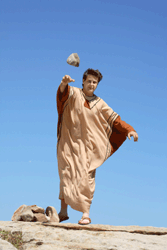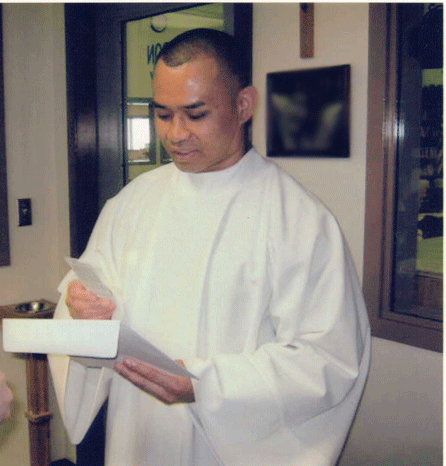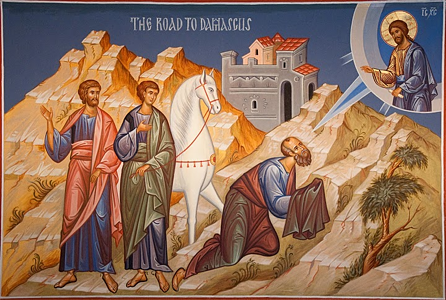The Conversion of Saint Paul, And the Cost of Discipleship
 The Conversion of Saint Paul, an absurd irony in Sacred Scripture, has a clear message: Conversion is not evil expelled, it is evil transformed.Is there anyone in your life for whom you have given up all hope for redemption? Anyone for whom you've given up any expectation of fundamental change at their very core? If so, then the story of the Conversion of Saint Paul should speak volumes to you about the grace of conversion and the need to hold out hope for those who seem hopeless.In an April, 2010 post, "Breaking News: I Got Stoned With the Pope!" I described the horror of the Biblical form of execution called "stoning." It first appeared in the Book of Exodus when Moses complained to God that the people he led out of bondage in Egypt had turned on him for leading them into the desert. They gave no thought to where they had been or where they were going. They only grumbled about where they are now:
The Conversion of Saint Paul, an absurd irony in Sacred Scripture, has a clear message: Conversion is not evil expelled, it is evil transformed.Is there anyone in your life for whom you have given up all hope for redemption? Anyone for whom you've given up any expectation of fundamental change at their very core? If so, then the story of the Conversion of Saint Paul should speak volumes to you about the grace of conversion and the need to hold out hope for those who seem hopeless.In an April, 2010 post, "Breaking News: I Got Stoned With the Pope!" I described the horror of the Biblical form of execution called "stoning." It first appeared in the Book of Exodus when Moses complained to God that the people he led out of bondage in Egypt had turned on him for leading them into the desert. They gave no thought to where they had been or where they were going. They only grumbled about where they are now:
"So Moses cried out to the Lord, ‘What shall I do with these people? They are almost ready to stone me!’” (Exodus 17:4).
Long before it was legislated in the Torah, stoning as a form of execution likely began with the reaction of an angry mob - perhaps the same angry mob Moses faced in that Sinai desert. Stoning became a method of mob execution in Israel because it lacked any identifiable blood guilt. As the stones let loose from the hands of the mob, no one person could ever be identified as "the executioner" because no one but God could tell who struck the fatal blow. Stoning was proscribed in the Torah for any number of offenses including idolatry, blasphemy, wizardry, child sacrifice, Sabbath violations, adultery - almost always blamed on the woman involved - and being gored by thy neighbor's ox.Lest you think that stoning as a method of execution is long gone in the "civilized" world, think again. It has just taken another form. It is names and reputations, and not bodies, that are bludgeoned to death today. The modern form of stoning takes place in the news media, or on blogs - even Catholic blogs - but it's just as lethal. Whoever can make the most noise whoever holds the media microphones and spews out the loudest, most venomous rhetoric - is judge and executioner on behalf of the mob, stirring it up for the kill. That's how stoning takes place today. Someone's name is dragged into the public muck, then pummeled with accusations, innuendo, half-truths, and outright lies.

Saint Stephen, the first martyr in the Christian world, was stoned to death. Stephen was one of "The Seven" appointed to serve tables - the traditional role of a deacon - in the Church at Jerusalem. He was brought before the Sanhedrin to answer for placing final authority in Christ instead of in the high priest and Temple. The mob was stirred up against him by the Sanhedrin, and he was stoned.No one present at the stoning of Saint Stephen could have possibly predicted the transformation of Saul into the Apostle Paul. Consider this one passage and feel its chill:
"Now when they heard [Stephen] they were enraged, and ground their teeth against him . . . They cried out with a loud voice and stopped their ears and rushed together upon him. They cast him out of the city and stoned him; and the witnesses laid down their cloaks at the feet of a young man named Saul." (Acts of the Apostles 7:54-58)
Saul was ruthless. He was not content to simply despise the people of The Way. He hunted and prosecuted them, condemned them, and stood watching as they were murdered. After the stoning of Saint Stephen, "Saul laid waste the Church, and entering house after house, he dragged off men and women and committed them to prison." (Acts 8:3).No one who knew Saul then could have ever held any such delusional notion that he might embrace the very thing he despised, become its champion, and set in motion the next two millennia of Christianity. The moment of transformation was just that - a moment. In Acts of the Apostles, Saul was on his way to Damascus to arrest followers of The Way and bring them back to face judgment, prison, and death in Jerusalem. Then suddenly:
"A light from heaven flashed about him. And he fell to the ground and heard a voice saying to him, 'Saul, Saul, why do you persecute me?' And he said, 'Who are you, Sir?' And the voice said, 'I am Jesus whom you are persecuting; but rise and enter the city and you will be told what you are to do.' Saul arose from the ground, and when his eyes were opened, he could see nothing . . . and for three days he was without sight and neither ate nor drank." (Acts 9:3-9)
The scene has many elements similar to one I described in "Saint Gabriel the Archangel: When the Dawn From On High Broke Upon Us." Like Zechariah left mute following news from the Archangel Gabriel, Saul lost his sight. Don't read the above passage with matter-of-fact monotone. Read it as the theophany it was for Saul, with the Earth trembling beneath his feet, his heart pounding, his sudden blindness terrifying, and "The Presence" overwhelming - like the one I once described in "Mirror of Justice, Mother of God, Mystical Rose, Our Lady of Sorrows." Like Zechariah, father of John the Baptist, once Saul was on his feet again his life would never be the same.Some seventeen years went by, then Saul emerges in Scripture once again as the great Paul the Apostle on the three missionary journeys described later in Acts of the Apostles - journeys that, like John the Baptist before him - as I wrote in "Down the Nights and Down the Days," - would land him in prison.There was a price to be paid for Paul's conversion, but he never once missed the days of being Saul. Saul was never gone, however. He was merely transformed, and that transformation - that cost of discipleship - was expensive. He went on to describe it to the Christians in Corinth who were consumed in some petty dispute about who was most qualified to be a spiritual leader. Paul silenced the debate with this list of his own "qualifications" which included:
"[F]ar more imprisonments, with countless beatings, and often near death. Five times I have received at the hands of the Jews [of which Paul himself is one] the forty lashes . . . Three times I have been beaten with rods; once I was stoned. Three times I have been shipwrecked; a night and a day I have been adrift at sea; on frequent journeys, in danger from rivers, danger from robbers, danger from my own people, danger from Gentiles, danger in the city, danger in the wilderness, danger at sea, danger from false prophets, in toil and hardship, through many a sleepless night, in hunger and thirst, often without food, in cold and exposure ... If I must boast, I will boast of the things that show my weakness." (Second Letter to the Corinthians 11:23-30)
When I began going to Mass as a teenager, as I described recently in "What Do John Wayne and Pornchai Moontri Have in Common?" I remember unloading my grief with a priest who had become my friend. I could never forget what he told me:
"You should see suffering in another light. If all is going well for you as a Christian, it's only because someone else is paying that toll. Thank God for them."
FREEDOM FROM PRISONOne sign of an election year is all the public rhetoric about draconian measures to make prison a worse place than it already is or needs to be. Most legislators don't get it that men and women are sent to prison "AS" punishment and not "FOR" punishment. Yet every election cycle, much energy goes into devising ways to make it a more inhumane environment.A few years ago, one New Hampshire legislator proposed that medical care in prison should be one step removed from veterinary care. One TSW reader with a very pampered dog thought that might actually be an improvement. This year, another legislator has proposed cutting the prison food budget - currently at less than $1.00 per day per prisoner - by eliminating all meat products and serving a forced vegetarian diet. That might even backfire in terms of cost. If I eat nothing but spinach and tofu for 67 years, I might just live to age 108 which is when my prison term is up.There are 119 references to prison or prisoners in Judeo-Christian Scripture. Without doubt, prisons and the imprisoned are of great concern to God. I have heard from many TSW readers who know someone - sometimes someone very close - who is, or has been, in prison. Often these readers have long since given up hope for any clear signs of redemption in those persons, and they ask me to pray for them.But that request is itself evidence that hope isn't really lost. I would not be writing about this had I not seen so many examples of people who change so radically that it seems miraculous. I wrote of three such people in "What Do John Wayne and Pornchai Moontri Have in Common?" One was my own father.Last August, our friend Pornchai was featured in an article entitled "Voices from Solitary: Welcome to Supermax" by writers Jean Casella and James Ridgeway. It was posted at Solitary Watch, a prison reform website. Those who know Pornchai from these pages - and the many TSW readers who have written to him - may have a hard time contrasting his current life as a devoted Catholic with the worst time of his life as described in the article.The gist of the article is its graphic depiction of life in solitary confinement in a "supermax," or high security prison. Knowing Pornchai today, it's hard to imagine him in the predicament the interviewers described: being forcibly “extracted" from a cell by men in full riot gear. The writers provided a video link depicting a typical such incident in the life of a high security prisoner.PORNCHAI'S NEW TESTAMENT

In the article's first paragraph, however, the writers referred to Pornchai's "early life, as well as his crime, incarceration, and conversion to the Catholic faith." That conversion was presented as a sort of gateway between a life of misery and a life of hope - even in the face of the cost of discipleship that Saint Paul became so willing to pay. Ryan MacDonald wrote of this transformation in "Pornchai Moontri at the Narrow Gate." Pornchai used to be hesitant about putting his conversion story in public view. His background is filled with so much pain and anguish that he thought it best to keep it private.Then one day after the Catholic League published "Pornchai's Story," he got a letter from an old friend he knew on the .mean streets where he grew up. The friend had been in and out of prison, leading a hopeless life. So one day this friend did a Google search for Pornchai's name. To his amazement, he did not see just the awful reports of Pornchai's childhood crime that dominated such a search just a few years ago. Like Pornchai himself, the Google search result had been transformed, and was filled with signs of hope.The friend read of Pornchai's conversion, then wrote a letter. "If you can do this," he wrote, "then so can I." He wrote of returning to the Church and his faith, of radically transforming his life, and his inspiration was Pornchai who remains stunned by the ripple effect of his own trials and triumph.Pornchai learned from this letter that “no one lights a lamp, then places it under a bushel basket” (Matthew 5: 15).One such ripple effect has been experienced by our friend, Donald Spinner, a Catholic convert whose road to faith was inspired in prison by Pornchai's example. With echoes of Saint Augustine and the prayers of his mother, Saint Monica, Donald described his journey to faith inside prison walls:
"My mother - God rest her soul - once gave me a Saint Christopher medal because I think she always knew I would spend my life in search of something, anything, that was better than the life I was leading. I believe today that Saint Christopher did in fact protect me many times and so did the prayers of my mother.I was always fighting, sometimes just to fight. I was always looking for something and it was very hard for me to be faithful to anything or anyone. Then something changed. Two years after my Mom's death, and two days after her birthday, I became a Catholic. My aunt had encouraged me to go to church. I just drifted further, eventually dabbling in all the 'born again' stuff, but I just never felt at home. But I felt this strange peace even inside prison around my good friends, Pornchai Moontri and Father G. The acceptance, patience and kindness in their eyes is so unlike all the rest of prison, and all the loss and emptiness in my life was such a contrast to the life they were leading inside these stone walls. Pornchai especially has influenced so many people here. We all expect Father G to be a good person, but Pornchai's life of grace is inspiring to everyone.On the day I became Catholic, I felt whole and at true peace for the first time in my life. Like Father G wrote here, evil was not expelled, just transformed, and I have had my challenges. A few months after I was Baptized and Confirmed in my faith, I went once again to ‘the hole’ for losing my temper and smacking another prisoner. I felt so ashamed and lost during those months in the hole. But when I emerged again, Pornchai and Father G were there waiting for me, challenging me to leave the past in the past, and daring me to do better. The cost of discipleship for me has been the loss of my selfishness. No one can be selfish in such company. Father Bernard Campbell, a Capuchin priest who comes to the prison, and Deacon Jim Daly, the prison Chaplain, have also been strong influences since my conversion.I have learned from these men that God cares not about who you were. He cares about who you are becoming. I have done bad things in my life, but I did not do the things that landed me here. Father G told me that no one needs to know that but me and God, and, if it's true, then I am living a great privilege - a share in the suffering of a blameless Christ.I do not like prison. I would have to be bonkers to like it. But I do my time in the light of faith now instead of in the darkness of despair and self-pity." Donald Spinner, January 2012
From the words of Saint Paul:
"I therefore, a prisoner of the Lord, beg you to walk in a manner worthy of the calling to which you have been called, with all lowliness and meekness, with patience, forbearing one another in love, eager to maintain the unity of the Spirit in the bond of peace." (Ephesians 4: 1-3)"Do not be ashamed then of testifying to our Lord, nor of me his prisoner, but take your share of suffering for the Gospel in the power of God, who saved us and called us with a holy calling, not in virtue of our works but in virtue of his own purpose and the grace he gave us in Christ Jesus ages ago." (Second Letter to Timothy 1:8-9)
